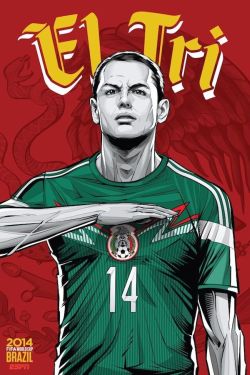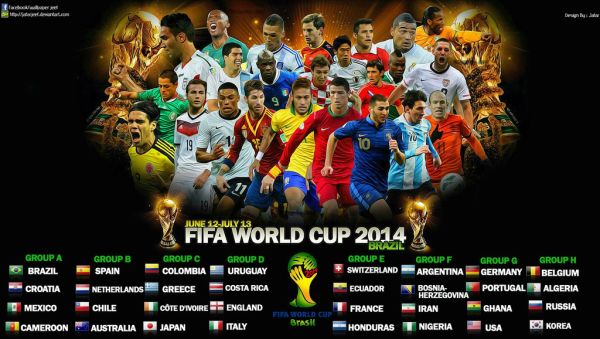The World Cup, that quadrennial international soccer tournament which draws so much attention worldwide, was held in Brazil from June 12th to July 13th. Thirty-two national teams competed in stadiums in twelve Brazilian cities.
 |
1. Asian Football Confederation: Iran, South Korea, Japan and Australia
2. African Confederation: Algeria, Cameroon, Ghana, Ivory Coast and Nigeria
3. North America, Central America and Caribbean Federation: Costa Rica, Honduras, Mexico and the United States
4. South American Federation: Argentina, Chile, Colombia, Ecuador, Uruguay, and host nation Brazil
5. European Federation: Belgium, Bosnia and Herzegovina, Croatia, England, France, Germany, Greece, Italy, the Netherlands, Portugal, Russia, Switzerland, and Spain.
For those of you who don't know much about the World Cup (and don't feel bad, I used to didn't either) here's how it works.
At the beginning of the tournament, the 32 national teams are divided into groups of four. In the first round, each team plays the other three teams in the group. At the end of this first round (three games per team), two teams from each group are eliminated and two stay in the tournament. That leaves 16 teams for the second round.
The next round, with the 16 teams, it's single elimination. If a team loses, it's out.
Following the Round of 16 are the quarter-finals, with only eight teams.
By the semi-finals there are four teams left. These teams are paired off, and the two losing teams take on each other for the third-place playoff. The next day, the two winning teams play each other for the World Cup championship.
In this year's World Cup, the final game was Argentina vs. Germany. Team Germany was triumphant, 1-0. This was the team's first World Cup victory since before the union of West Germany and East Germany on October 3rd, 1990. West Germany had won three World Cups before the union, in 1954, 1974 and 1990. (The 1990 World Cup victory was on July 8th, 1990, thus just a few months before unification).
In the past, every single World Cup held in the Western Hemisphere (known in Spanish as the continent of América) had been won by a team from the Western Hemisphere. But Germany broke that tradition, so it's no longer true.
Of course, out of 32 teams, there can be only one winner at the end. That's the whole point. Yet, for particular reasons, some teams and their fans were more disappointed than others.
Spain, the winner of the previous World Cup in 2010, did poorly and was eliminated in the first round.
Brazil, the host country, is the only nation to have played in every single World Cup and the winner of more World Cups (5) than any other country. However, in the quarter-finals, Brazil was demolished 7-1 by Germany. Television coverage showed the faces of devastated Brazilian fans in the stadium. Brazil still had a chance to get third place in the tournament, but its defeat at the hands of the Netherlands team left it in 4th place.
The winner of the Golden Boot award, for the highest scorer of the tournament (not counting penalty shots) went to James Rodriguez of Colombia, who'd scored 6 goals.
The winner of the "Golden Ball" award (considered the most valuable player) was Lionel Messi of Argentina.
The Fair Play trophy was won by Team Colombia.
On the other side of the coin, player Luis Suarez of Uruguay was fined and banned for four months and for nine international matches, for biting (yes, biting!) an opponent during the Uruguay-Italy game. (This was not the first time Suarez had bitten an opponent.)
Argentina, with two World Cup victories in its history, had high hopes, and faced off against Germany for the final game, but was defeated.
As for Mexico, its team played four games in the World Cup:
 |
2. Team Mexico faced Brazil on June 17th. The result of this hard-fought game was a 0-0 tie. This felt like a victory for the Mexican fans.
3. On June 23rd, Mexico faced Croatia, and the Mexicans beat the Croatians 3 to 1.
4. On June 29th, in the knockout phase, Mexico faced the Holland team. The Dutch beat Mexico 2 to 1, thus eliminating the Mexicans from the World Cup.
There was a controversial call in that game which was much-discussed afterwards. Mexican player Rafael Marquez received a foul for tripping Dutch player Arjen Robben. Mexican coach Miguel Herrera (El Piojo) disagreed with the penalty, as did many Mexican fans. The slogan No Era Penal ("it wasn't a penalty") erupted on social media, and at least one piñata of Arjen Robben was spotted in Mexico. Looking at video of the game, and the still shots, it appears to me as though Marquez did trip Robben. Robben is known for "diving" or "flopping," exaggerating the gravity of a fall in order to bring a penalty. But it's not just Robben, it's typical of contemporary soccer, a sport in which players exaggerate and over-dramatize. Like it or not, it's a part of the game, in other words!
Thus ended Team Mexico's 2014 World Cup participation.
On the bright side, the Mexican team did not have to hitchhike back to Mexico. They did not exit the tournament empty-handed, nor did any other team.
A lot of money was doled out at the World Cup, as FIFA (the governing board of international soccer) paid out US $576 million. Even the teams who lost in the first round received $8 million dollars apiece, and the winning team (Germany) received $35 million.
The World Cup is held every four years, and the next two sites have already been chosen. The plan is for World Cup 2018 to be held in Russia, and World Cup 2022 in Qatar, a small but prosperous Persian Gulf nation. Allan Wall is an American citizen who moved back to the U.S. after living and teaching English in Mexico for a decade and a half. Today, he continues to write articles about various aspects of Mexico and Mexican society. Some of these articles are about Mexico's political scene, history and culture, tourism, and Mexican emigration as viewed from south of the border, which you can read on his website at AllanWall.info.
Allan Wall is an American citizen who moved back to the U.S. after living and teaching English in Mexico for a decade and a half. Today, he continues to write articles about various aspects of Mexico and Mexican society. Some of these articles are about Mexico's political scene, history and culture, tourism, and Mexican emigration as viewed from south of the border, which you can read on his website at AllanWall.info.


